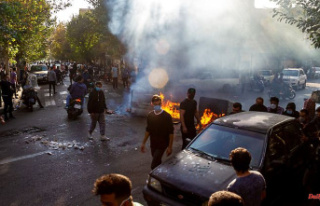The principle of national sovereignty was established in Münster with the Peace of Westphalia. Foreign Minister Baerbock is now emphasizing solidarity with Ukraine at the G7 meeting in the historic "Peace Hall" and announcing aid deliveries.
Foreign Minister Annalena Baerbock has announced a coordinated action by the G7 group of economically strong democracies to provide winter aid for Ukraine. "The joint sanctions that we initiated are now being followed by joint winter aid from G7 partners," said the Greens politician at the start of the consultations in Münster, Westphalia. Many other countries have already announced that they will join. "This winter aid also means that we do not accept that peace and international law will be broken over the winter," stressed Baerbock.
"We will not accept," said the Green Party politician, "that the Russian President is successful with his strategy of breaking up Ukraine. We will not accept that he is hoping that international cohesion will be broken." The G7 group also includes France, Italy, Japan, Canada, the US and the UK. Germany will hold the presidency until the end of the year.
Baerbock accused Russian President Vladimir Putin of sinking deeper into inhumanity over the attacks on Ukraine's energy infrastructure. The G7 will not allow mass deaths of the elderly, children and young people by starvation and freezing to death. Germany has already launched more than 100 generators to stabilize the power grid. In addition, heaters, pumps, residential and sanitary containers, beds, blankets and tents are supplied.
Baerbock emphasized that she carefully chose the location of the meeting given its symbolism. The city of Münster and the Hall of Peace embodied the concept of peace and the rule of law - as did the G7 meeting. The Peace of Westphalia, which ended the Thirty Years' War, was negotiated in this room in 1648. "With the treaty, the idea of peaceful cooperation between states as sovereign and equal states was born. It laid the foundations of modern international law," she said.
With a view to China, which is also acting militarily more aggressively than before, Baerbock said that one would talk about "how we don't repeat the mistakes of the past that we had in Russia policy again". Beijing is not only a partner on international issues, but also a competitor and a much stronger rival than it used to be when it comes to understanding an international order.
The situation in Iran is also a topic of discussion for the G7 meeting. The Foreign Minister severely criticized the regime for the violent crackdown on the system-critical protests. For weeks we have been witnessing "the brutal violence with which the Iranian regime is treating its own citizens. How it is beating up its youth and its society, and people are being killed in the process," she said. In doing so, she also justified the departure request for German citizens.
There was also a demonstration on the fringes of the G7 meeting. Several demonstrations and rallies passed without major incidents until the evening. "So far everything has been peaceful," said a police spokeswoman. According to the police, a total of 13 demonstrations with several thousand participants were registered by Saturday.












